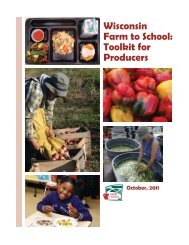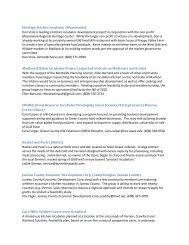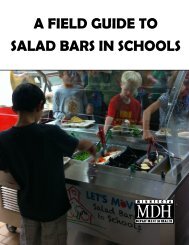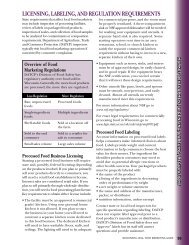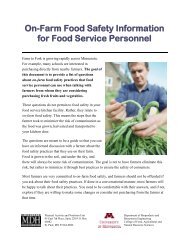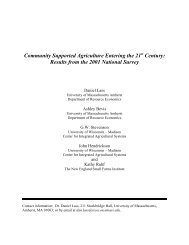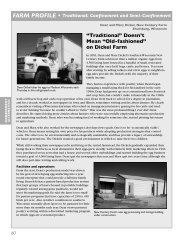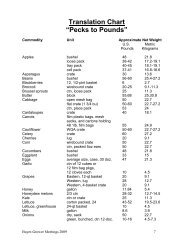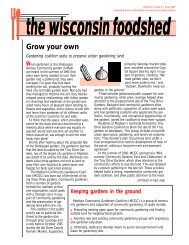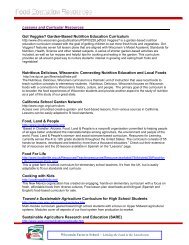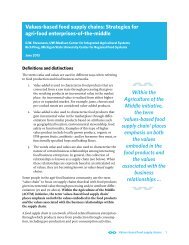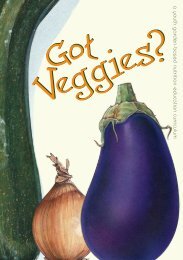Poultry Your Way - Center for Integrated Agricultural Systems ...
Poultry Your Way - Center for Integrated Agricultural Systems ...
Poultry Your Way - Center for Integrated Agricultural Systems ...
You also want an ePaper? Increase the reach of your titles
YUMPU automatically turns print PDFs into web optimized ePapers that Google loves.
FARM PROFILE • Industrial: Confinement<br />
Turkey manure composting. Joel Bussis markets<br />
the compost to local farmers.<br />
The compost is short one element—water. “The manure cake is quite<br />
dry, 17 to 22 percent moisture, and the brooder manure is drier still,”<br />
Joel said. “You need 40 to 50 percent moisture to get a good heat<br />
going.” He piles the manure into windrows and waits <strong>for</strong> rainfall to<br />
raise the moisture level. A 1,500-gallon water wagon can be used to<br />
add water if needed. Composting is a key part of the operation, <strong>for</strong><br />
without a good waste disposal system the operation is not viable.<br />
Feed and feeding are highly automated. Trucks bring prepared feed<br />
several times a week, unloading it into bins. Flexible augers move the<br />
feed from bins into feeders.<br />
The Cooperative<br />
The term used to describe the organization of much of the poultry industry is “vertical integration.” When Bil-Mar<br />
in<strong>for</strong>med its contract growers of the company’s plans, it didn’t call it “dis-integration” but “de-verticalization.”<br />
Dr. Allan Rahn, a poultry economist at Michigan State University (MSU), analyzed the potential impact of Bil-<br />
Mar’s decision. A conservative estimate of the economic impact that elimination of the growing, slaughter, and<br />
boning of turkeys would have had on the region’s economy was $171 million and 1,344 jobs, he said. Roughly<br />
$113 million and 464 of the lost jobs would be accounted <strong>for</strong> by farm level impacts. Bil-Mar’s move would also<br />
have had adverse consequences on local corn and soybean market prices, as the growing turkeys used more than<br />
two percent of the corn and almost four percent of Michigan’s soybean production. The remaining dollar and<br />
job impacts were attributed to the slaughter and boning activities, mitigated somewhat by other value-adding<br />
activities Sara Lee planned to conduct in the reclaimed space at the Zeeland plant.<br />
Faced with the economic consequences of the shut-down, the turkey growers had to decide whether to meekly<br />
quit or try to protect their industry. They decided to join together and face the problem as a group rather than<br />
as individuals. They created the Michigan Turkey Producers Cooperative (MTPC), electing John Bussis their first<br />
chairman of the board. Ultimately, they acquired property and, using cutting-edge technologies, retrofitted an old<br />
plant to per<strong>for</strong>m the turkey slaughter and processing operations that Bil-Mar had discontinued.<br />
MTPC’s facility started accepting birds <strong>for</strong> processing the week of March 6, 2000. Remarkably, Rahn said, this<br />
occurred only slightly more than a year after Bil-Mar closed its plant. When the growers decided to band together<br />
and <strong>for</strong>m a cooperative that would replace the Bil-Mar structure from growing to processing to marketing, they<br />
had only a few resources to start. They had their own on-farm investments to consider. They had a pool of Bil-Mar<br />
employees who had skills and were losing their jobs. But they had no processing plant and no market.<br />
First, they turned to Rahn, the MSU poultry economist, <strong>for</strong> his opinion. Dan Lennon, the chief executive officer and<br />
general manager of the finished plant, said: “Al Rahn did most of the in-the-trenches work <strong>for</strong> us, meeting with our<br />
growers and helping us figure where we’d fit in the industry and what the opportunities were.”<br />
Rahn received funding support from MSU’s special Animal Agriculture Initiative and also from MSU Extension.<br />
Ottawa County, where the Michigan turkey industry was concentrated, chipped in county money and Extension<br />
help to organize the growers. Extension agent Chuck Pistis still serves as the co-op’s recording secretary. A retired<br />
MSU Extension poultry economist, Bud Search, helped the co-op develop a new brand identity, called “Golden<br />
Legacy.”<br />
The new cooperative located an idle potato processing plant in Wyoming, just south of Grand Rapids in western<br />
Michigan. While the exterior of the plant is warehouse-like and nothing special to look at, Lennon describes the<br />
interior as “top drawer.” “This was the first new facility built in the U.S. in 15 years,” he said. “It is state-of-the-art,<br />
incorporating all the newest knowledge <strong>for</strong> safe food handling.”<br />
55<br />
MANAGEMENT<br />
ALTERNATIVES



